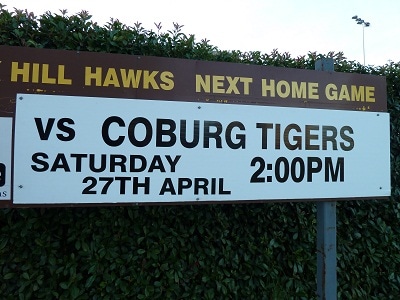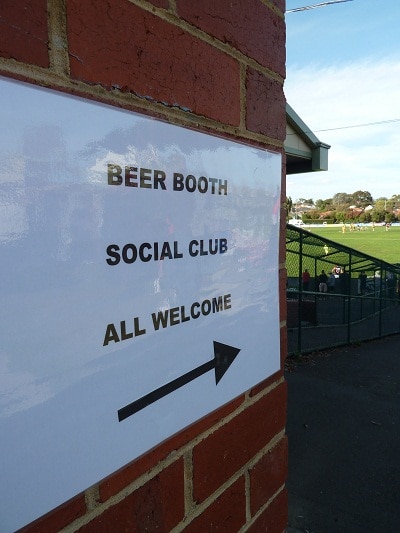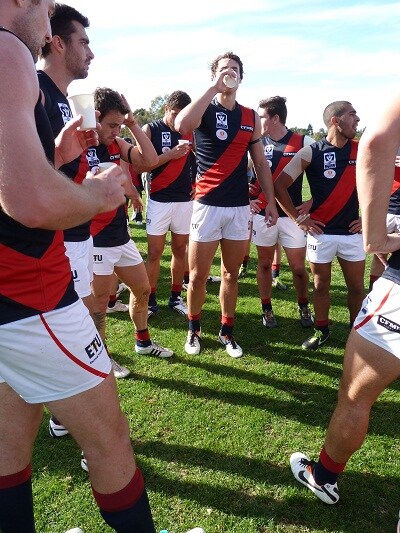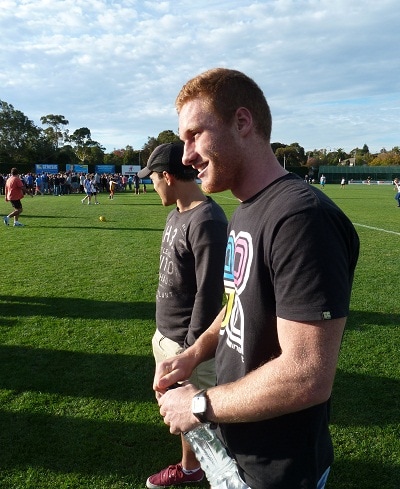Less than an hour before the opening bounce last Friday night, I received an email from Afghanistan. It was addressed from Tarin Kot, written by Captain Adam Dobney, a fourth-generation Richmond supporter, on deployment in a theatre of conflict, but for now readying for the welcome distraction of watching a game of football via satellite feed. “Your articles are much appreciated for bringing a season that we’re missing closer,” he wrote. “They keep me part of the Tiger Army, even though my other one has taken me a little further from home.”
At 9.04pm, with Richmond two goals up, I sent a brief reply: “Thank you for your email, it’s made my night. Now, hopefully, we can win this game.”
Here was a moment of companionship. In this darkened hour, we were two men joined by a shared passion – for football, for Richmond – watching a game played between us, in a time zone that was variously two hours behind and three-and-a-half hours ahead, and for which, cruelly, every last minute would count.
For these two hours of game time, we joined in something beyond us. We were to become consumed by a winter’s ritual of watching football on television, of barracking from afar, of sharing a tacit understanding of what it is to be a Tiger – an unknowable emotion of pride and loyalty, a visceral passion, but a burden also of hurt and melancholia.
We celebrate together, we bleed together. On Friday night, the two of us were among many – a silent crowd mostly in lounge-rooms, on armchairs and couches – finding new ways to feel loss. Defeat rarely has left us feeling so bereft; so despondent, so close to the midnight hour.
**
Saturday morning and the sun shone, and in the afternoon I drove to City Oval in Box Hill looking for group therapy. The Box Hill Hawks were playing the Coburg Tigers and I needed to stand on a terrace among the brethren. I wanted the balm of suburban football – circling players on the ground at the quarter-time huddle, steamed ‘dimmies’ and a pie from the canteen, children playing kick-to-kick at half-time – and its public gathering before a grassed oval.

I wanted to see Nathan Foley in action, watch Orren Stephenson’s tap work, and try to read the development of players like Matt Dea, David Astbury, Ben Griffiths, Sam Lonergan, Tom Derickx, Liam McBean and Aaron Edwards, running around in the ‘twos’, waiting their turn.
But I came to see my first Coburg Tigers game mostly because I needed consolation. The day after the night before and a heartbreak shared is a heartbreak halved. I wanted to make sense of the loss. I wanted a group hug. I wanted to be among other Tigers, both to grieve and lend support, as a self-prescribed counselling session among those who’d understand.
“Had a night of broken sleep,” says Ian Kerr, 50, from Croydon, attending the game with wife Sue and their 13-year-old golden retriever, Kase. “I wasn’t overly disappointed in how the boys played, but you always wake up better when you’ve had a win.” Sue is equally philosophical. “I’m very proud they didn’t give the game away,” she says. “There’s always next week.”
Behind the Whitehorse Road end goals, I meet Sabrina and Marcus Siegel, 34 and 41, both from Ormond, who likewise had come along to try and expunge the malaise of defeat. “They looked shattered after the game,” says Sabrina. “The upside is that Vlastuin looked really promising. It was good to see fresh legs running around.”
Marcus says he’s an AFL member and had decided to see the Coburg Tigers play rather than watching, say, Carlton at the MCG. “I guess I’m trying to get over the disappointment of last night and see how Foley’s going,” he says. “It seemed to be the same mistakes of last year. Why couldn’t they play defensive in the last two minutes to protect the lead? Why didn’t they flood the backline?”
Alan Scott, 57, from Richmond, is also attending his first VFL match for the year. “Didn’t sleep well,” he says. “I was hoping we could win, but it wasn’t unexpected. The whole night we seemed to be bombing the ball into the forward line and their backline killed us.”

**
There were positives from Friday night’s game. Brandon Ellis was brilliant. Luke McGuane, if any doubted, has consolidated his position. Tyrone Vickery kicked three goals and perhaps should have had a fourth. Chris Knights’ finishing touches were polished. The back six can be well pleased for restricting Fremantle to 81 points, especially considering the ball spent more time at their end than ours. Dan Jackson contributed solidly. Trent Cotchin’s last quarter almost snatched a victory.
A day before the game I had sent Matthew White a Tweet of both public acknowledgment and encouragement. It read: Big opportunity for @matt_white35 tomorrow; hope he grasps it, runs with it, bounces it, scores with it. Hope he walks away a proud man. Matt White could walk away a proud man on Friday night. From limited opportunities, he contributed. He tackled, he corralled their forwards, he ran the ball when he could, and from a tight angle, in the dying stages, he kicked what should have been the match-winning goal.
It was a pressure act, and a moment to savour. He stood up when it counted. He showed all what he could do.
Earlier, I had sent Nick Vlastuin a Tweet also, on occasion of his call-up. Here is a big moment in a man’s life, and some part of me wanted to share in his joy and to make sense of the anxieties he must have felt. The message read, simply: @nickvlastuin congratulations and good luck tomorrow night. May it be the beginning of a wonderful time in your life.
The gods of football are fleeting. It is a chancy business, weighted with so much public expectation and scrutiny. A man has nowhere to hide on a football field, nowhere to run to. The first observation I made on my notebook on Friday night was late in the first quarter and it read, in short hand: 1.37 Vlastuin (tackle).
This young man with the comic-book good looks, from Netherland parentage via the old Dutch East Indies and who’s played his football in the shadowy hills of Eltham, now under Friday night lights announced himself on the big stage. In a play near the boundary on the half-back line, he made a string of efforts – a heavy tackle, a contested possession, a gather from a stoppage – watched by a national audience.
It’s only a start, but the portents are good. He looks a footballer.
And, sometime during the game, my partner – a historian by trade, who soon after we met watched me play in a losing grand final in my last season as a player, and hasn’t attended a football game since – said: “No wonder all the teenage girls love Dustin Martin, he’s so exciting to watch”. And, on Friday night, he was. The man is a machine. He’s a weapon. I’ve not seen many players stronger in the hips than he is. I’ve not seen many players who can kick a ball like he can. I’ve not seen many players who can shrug tackles and break lines and fend off opponents like him.
Often, when I meet children wearing Richmond jumpers, I ask who their favourite player is and invariably the reply is ‘Dusty’. Children see through clear eyes and open hearts. It’s an uncomplicated vision. What they see in Dustin Martin is someone who can do things on the football field others cannot. They see a man who excites them, who burns in their imagination.
I hope Dustin Martin has a stellar season. I hope football gives him all the pleasures that so many receive when they watch him play.
**
A stiff wind blows at City Oval on Saturday. A good crowd turns up, mostly wearing brown and gold, sitting in the sun on bitumen terraces edged with bluestone blocks, or on picnic blankets on grassed embankments around the ground. Eucalypt limbs sway in the breeze. The backdrop to the far wing is a picture of suburbia: house gable-ends, red-tile roofs, TV antennas.

I meet a 39-year-old man from Blackburn North wearing a Richmond scarf, here with his mother, who tells me his name is Matthew Richardson. “It’s not that bad now that he’s retired, but when he was playing I’d get references to it all the time,” he says.
For the first quarter, I stand by the interchange bench, listening to instructions and comments from the players. “Let’s get ‘Big O’ into the ruck,” calls out fitness coach Rob Innes. “We want to give Aaron Edwards two rests for the game,” says the runner. “Did Benny Griffiths get two rotations that quarter?” asks the physio. On the bench, Daniel Younan, 20, a Coburg player in rehabilitation after a recent knee reconstruction, moves magnetic name plates around the whiteboard.
Late in the first quarter, Brett O’Hanlon is helped off the ground, wincing in pain. His left boot is unlaced and pulled off gingerly. Already his nostrils have been plugged up after an earlier knock. He gasps in discomfort. It looks a hard way to earn a living.
At half-time there’s only a point in it, and the field becomes a carnival of spinning footballs in all sizes and colours. On the wing, former Richmond captain and now opposition analyst coach, Wayne Campbell, plays kick-to-kick with his five-year-old daughter. He’d travelled with the team on the flight back from Perth, on the overnight red-eye landing in Melbourne before dawn. “A pretty quiet flight home,” he says.
Hawthorn’s senior coach, Alastair Clarkson, is down the other end in the goal square, playing goal umpire to his son, who takes shots from the boundary line. “I’m gonna go into the rooms, mate,” he calls out. His son asks back: “Did you like my goal?”
My interest is as much with the spectators as it is with the players, although several Coburg Tigers catch the eye. I like what I see in Matt Dea. He looks poised and accomplished, and kicks an inspiring, running goal in the third quarter. David Astbury takes plenty of defensive marks when the wind is against us. Nathan Foley provides much run and clear decision-making when he comes on after quarter-time. Aaron Edwards knows where the goals are. And, Nick Maric, a young ‘Burgers’ player, impresses me with his dash and courage.
But it’s Orren Stephenson who stands tallest in the pack. The man seems an honest footballer. He comes off huffing and puffing late in the first quarter; already he has given it his all. His work ethic cannot be questioned. He discusses the sway of the game with others on the bench. He pinpoints strengths and weaknesses. He talks to his teammates. He seems a generous player, teaching others what already he has learned. Leadership, it’s written all over him.
**
At three-quarter time I see Stevie Morris on the ground, and Nick Vlastuin fresh from his debut, along with big Tyrone Vickery.This pleases me that they’ve come to the game, after a long flight home, because it shows club spirit. A club is as strong only as its weakest member, and here is an act of solidarity, of support for those who support the senior team. It’s a dog-eat-dog business, being a footballer, but it’s also a large family. There is room for loyalty, and friendships, and sentiment.
I congratulate Nick on his debut and wonder what it must have meant for him.

One week he’s playing suburban football at Coburg, next week he’s flying to a far end of the country to play a game televised to a national audience. It must be surreal.
I ask Tyrone about the incident in the goal square when the ball hit the goal umpire. I tell him from the camera angle it looked as though it might have been a goal, but that much of the Channel 7 camera work on Friday night was uncertain. From Tyrone’s spontaneous reaction, it was a goal. He says it was a goal. He says it came off his boot and he thought it crossed the line.
I did not wish to talk about the last 1.59 minutes of the game. Everybody who knows anything about football knows what went wrong. These things are best not dwelt on.
**
On Saturday night at a friend’s 50th birthday party, I was introduced to Jeff ‘Torch’ McGee, and at first was unaware of his public persona. He played seven games for South Melbourne in the 1967-68 seasons, kicking seven goals in two wins, two draws and three losses. It sounds a remarkable short career. But these days, he’s better known, of course, for his work with the Coodabeen Champions – the comedy football show that’s been part of Melbourne radio since first airing in 1981 on 3RRR.
He’s an unassuming man, with a gentle demeanour, a strong sense of community, and a deep faith in humanity. He seems like a football sage, a storyteller, and if I weren’t so tired from the restless sleep after my team had such an anguished loss, I could have listened to him all night.
The conversation spun variously from South Melbourne, to its old Riverina recruiting zone, to his playing days, to the health of Bobby Skilton, to the clean hands of Paul Roos, to the Fitzroy sides of the early 1980s, to Barry Hall, and to a team in Orbost I once played for. I tell him I had watched Coburg play that afternoon and he tells me stories about Jake King and his sister, both of whom he taught at TAFE in Heidelberg.
He tells me about Jake’s schooling, his plumbing apprenticeship, and how he played for North Heidelberg before moving to the Coburg Tigers, from where he was rookie listed by Richmond. I like stories like this; of hardship and perseverance and seizing an opportunity when it arises. It is the stuff of character.
An opportunity arose on Friday night in Perth, but my team did not seize it. Jake King, unfortunately, was powerless to do anything about it. My team, hopefully, has learned a lesson. Never again will they lose a game when they get their noses in front. Never again will they give the opposition so much free space in which to conjure a victory. What happened on Friday night is now history, and it’s not to be repeated. Not this season, nor next, nor the year after that. Never will it happen again.
Tiger tiger burning bright.
or Twitter: @dugaldjellie



